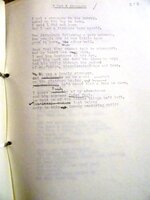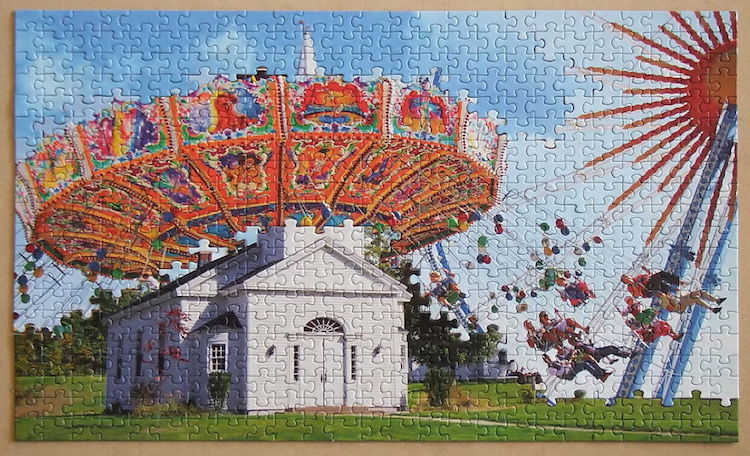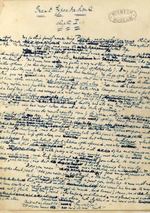M
Navigation
Install the app
How to install the app on iOS
Follow along with the video below to see how to install our site as a web app on your home screen.
Note: This feature may not be available in some browsers.
More options
Style variation
-
Café Life is the Colony's main hangout, watering hole and meeting point.
This is a place where you'll meet and make writing friends, and indulge in stratospherically-elevated wit or barometrically low humour.
Some Colonists pop in religiously every day before or after work. Others we see here less regularly, but all are equally welcome. Two important grounds rules…
- Don't give offence
- Don't take offence
We now allow political discussion, but strongly suggest it takes place in the Steam Room, which is a private sub-forum within Café Life. It’s only accessible to Full Members.
You can dismiss this notice by clicking the "x" box
You are using an out of date browser. It may not display this or other websites correctly.
You should upgrade or use an alternative browser.
You should upgrade or use an alternative browser.
- Status
- Not open for further replies.
E G Logan
Full Member
Pity the poor printer who had to work from that!
S
Susan
Guest
- Thread starter
- #3
Pity the poor printer who had to work from that!
Yikes. Probably made a few errors too.
Robert M Derry
Colony Member
Editing must have been so hard back then.
Paul Whybrow
Full Member
My favourite scary disorganised author is Thomas Wolfe, who used to plonk a vast pile of pages, menus, napkins and receipts on his publisher's desk and expect them to sort the randomly written scraps into book form.
From Wikipedia on his first novel Look Homeward, Angel:
Wolfe began the novel in 1926, intending to delve into "the strange and bitter magic of life." The novel was written over 20 months. On the novel's completion, Wolfe gave the vast manuscript to Scribner editor Maxwell Perkins. Though Perkins was impressed with the young author's talent, he demanded that the novel be revised and condensed to a publishable size. The two sat down and worked through it together. After being trimmed by 60,000 words, the novel was published in 1929.
Imagine trying to get away with such a devil-may-care tactic these days!
From Wikipedia on his first novel Look Homeward, Angel:
Wolfe began the novel in 1926, intending to delve into "the strange and bitter magic of life." The novel was written over 20 months. On the novel's completion, Wolfe gave the vast manuscript to Scribner editor Maxwell Perkins. Though Perkins was impressed with the young author's talent, he demanded that the novel be revised and condensed to a publishable size. The two sat down and worked through it together. After being trimmed by 60,000 words, the novel was published in 1929.
Imagine trying to get away with such a devil-may-care tactic these days!
I guess they had to get it more or less right in one single draft.
Easy. Phh.
Yeah, right.
Authors from back then are heroes in my view.
I love the 'delete' button on my keyboard. The 'back space' is wearing out.
Same goes for photography. They say that digital photography and photoshop have lowered photography skills. With a roll of 30 odd exposures you didn't have much room for errors. And we had to wait a week before we got to see the pics.
Easy. Phh.
Yeah, right.
Authors from back then are heroes in my view.
I love the 'delete' button on my keyboard. The 'back space' is wearing out.
Same goes for photography. They say that digital photography and photoshop have lowered photography skills. With a roll of 30 odd exposures you didn't have much room for errors. And we had to wait a week before we got to see the pics.
Tim James
Colony Member
That's still a fair bit better than my handwriting ... LOL...without software? The original hand-written manuscript of Great Expectations:
View attachment 3021
However, I do still do a full first draft in hand written form before then typing it all into the computer.
Two reasons for that:
Firstly, I'm not a fast touch typist and find that the keyboard gets in the way of my thought processes as I'm trying to get the scene down as I think about it. Writing by hand is more natural for me and thus quicker and less intrusive on my thoughts.
Secondly, the typing phase gives me a chance for a first line edit where I often pick up on all sorts of issues and often substitute words and phrases and correct punctuation and grammar as I go.
But each to his own and those born more recently than me may well find keyboards a more natural way of composing their prose.
Some time last week @Marc Joan got me to unearth my poems from the basement. So, here's one of them, typed on a Remington typewrite sometime during the century just gone. As you can see the ink is so faded that if I don't type them out on my pc pretty well soon, they will be gone forever- all 468 of them. Well, maybe it would be better that way.


E
Emurelda
Guest
- Thread starter
- #9
Fewer distractions...
That's still a fair bit better than my handwriting ... LOL.
However, I do still do a full first draft in hand written form before then typing it all into the computer.
Two reasons for that:
Firstly, I'm not a fast touch typist and find that the keyboard gets in the way of my thought processes as I'm trying to get the scene down as I think about it. Writing by hand is more natural for me and thus quicker and less intrusive on my thoughts.
Secondly, the typing phase gives me a chance for a first line edit where I often pick up on all sorts of issues and often substitute words and phrases and correct punctuation and grammar as I go.
But each to his own and those born more recently than me may well find keyboards a more natural way of composing their prose.
Like you Tim, I have some kind of "mystical" relationship with pen and paper. I can't explain it really but it "feels" as if thoughts flow from my mind through the pen unto the paper. However, as soon as I have something on paper I get it typed up immediately and then I start doing all my alterations. I have of course, learnt to compose on a p.c. just as easily- but the first love is never quite forgotten, is it? And it's a pity that schools nowadays don't consider learning to write with a pen and paper such a priority as it was in the past. Children miss out on that special bond that's called "handwriting."
Paul Whybrow
Full Member
Medical research has shown that writing things down by hand has many benefits:
Using Pen And Paper, Not Laptops, Boosts Your Memory
Increasingly, UK police forces are using iPads to take notes and write up reports. My Cornish Detective knows that his brain in stimulated in healthy ways by writing down ideas in longhand, so he keeps a separate notebook to record evidence and theories. I gave him this trait from my own practice, for though I record 99.9% of my notes in folders on my laptop, if there's a particularly awkward decision to make about a plot twist, I jot it down on a scrap of card that I place on my writing table. Somehow, my brain works away at this, coming up with a solution; stuff that I record digitally I often forget, as if I've absolved myself of its existence.
I've noticed that the muscles in my hand which I use for writing longhand have weakened, as I do it so rarely. I used to get cramp when first using a mouse, back in 1999, though I've since built up tendons that would do credit to an eagle!
Using Pen And Paper, Not Laptops, Boosts Your Memory
Increasingly, UK police forces are using iPads to take notes and write up reports. My Cornish Detective knows that his brain in stimulated in healthy ways by writing down ideas in longhand, so he keeps a separate notebook to record evidence and theories. I gave him this trait from my own practice, for though I record 99.9% of my notes in folders on my laptop, if there's a particularly awkward decision to make about a plot twist, I jot it down on a scrap of card that I place on my writing table. Somehow, my brain works away at this, coming up with a solution; stuff that I record digitally I often forget, as if I've absolved myself of its existence.
I've noticed that the muscles in my hand which I use for writing longhand have weakened, as I do it so rarely. I used to get cramp when first using a mouse, back in 1999, though I've since built up tendons that would do credit to an eagle!
Tim James
Colony Member
The real irony is that at school I was often marked down in English because my handwriting quality was so bad the teacher couldn't read what I had written.Like you Tim, I have some kind of "mystical" relationship with pen and paper. I can't explain it really but it "feels" as if thoughts flow from my mind through the pen unto the paper. However, as soon as I have something on paper I get it typed up immediately and then I start doing all my alterations. I have of course, learnt to compose on a p.c. just as easily- but the first love is never quite forgotten, is it? And it's a pity that schools nowadays don't consider learning to write with a pen and paper such a priority as it was in the past. Children miss out on that special bond that's called "handwriting."
Snap, it was the same with me @Tim James. I vividly remember when I was in class 3 of the Junior school (age 9\10) the teacher was so furious with me she threw the exercise book at me saying, "I have to give you a 10- but you don't deserve it- your handwriting is a disgrace!"
Tim James
Colony Member
With amazing foresight, bearing in mind it was the end of the 70s and very expensive personal computers were only just appearing, my science teacher told my parents not to worry because "people probably wont need to write much by hand in the future anyway."
Quillwitch
Colony Member
My most disorganized client ever was poor dear Mal Peet. He’d write swathes of text, from various parts of the book, then pore over them for days, like a giant jigsaw, figuring out how to connect them up...
Thatś exactly what I do. I wish I knew how to do it better. Ive been trying to put my jigsaw puzzles together for years now.
Paul Whybrow
Full Member
Thatś exactly what I do. I wish I knew how to do it better. Ive been trying to put my jigsaw puzzles together for years now.
Just hope that your manuscript doesn't end up as the writing equivalent of Tim Klein's jigsaw montages!
Jigsaw Puzzle Mashups by Tim Klein (9 Photos)

Quillwitch
Colony Member
Just hope that your manuscript doesn't end up as the writing equivalent of Tim Klein's jigsaw montages!
Jigsaw Puzzle Mashups by Tim Klein (9 Photos)

Oh my! Maybe that´s the problem and I haven´t realized it!
- Status
- Not open for further replies.
Further Articles from the Author Platform
Café Life Tag Cloud
2025
agent
author
authors
blog
book
books
cafe
calls for submissions
challenge
christmas
competition
conferences
contest
creativity
december
editing
fantasy
fiction
inspiration
life
literary
literature
litopia
love
motivation
music
new
news
novel
november
philosophy
poetry
prize
publisher
publishing
reading
self-publishing
sentence
shakespeare
short
short story
stories
story
time
world
write
writer
writers
writing
Similar threads
Thought for the Day
I never did a day’s work in my life ...
- Replies
- 2
- Views
- 651
Latest Articles By Litopians
-
Scheherazade’s Sandbox
The Year of the Snake, now coming to a close, promised introspection and wisdom. To help with this, ...
-
Where is the Love?
I recently heard an author say that, when he’s editing, one of the questions he asks himself is � ...
-
A Young Man’s Fancy: Tanzen Bitte
. “Tanzen bitte. Wanna dance?” “Ja.” “Err… do you Kommen sie hier often?” “Jeden Sam ...
-
Winging it
‘I could never write a book,’ a friend said to me recently. She meant it as a compliment and I a ...
-
The Monster We Were Promised
I tutor a small group of Year Five boys who love boardgames (let’s call them the Gamer Boys). We� ...
-
Character Building
I’m sure most of us have felt the excitement when we meet a new character. I wonder, do yours arri ...
-
Plain Grocery Stores
Right up the road from the Weaverland Auction, there’s an unnamed farm stand, its open front cover ...
What Goes Around
Comes Around!

